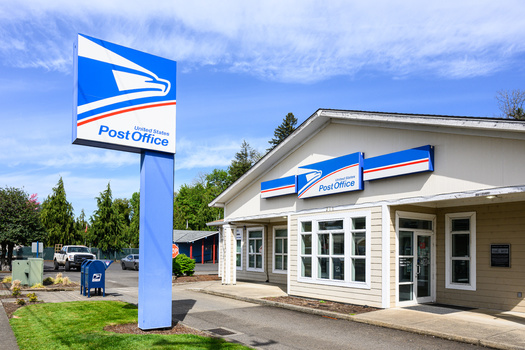Today is National Postal Workers Day, a celebration of the job they do to deliver the mail.
Postal workers provide a vital service, especially during big election years like 2024 and in states like Oregon where elections are conducted completely by mail.
Daniel Cortez, Oregon legislative and political director for the American Postal Workers Union, noted the critical role his colleagues play.
“Whether it be America’s election mail or letters from grandparents, care packages to our service members overseas, vital prescriptions for our seniors and veterans,” Cortez outlined. “It’s important to remember that all of that happens because of the dedication of the postal workers day in and day out.”
The United States Postal Service was established by Benjamin Franklin on July 26, 1775.
The Postal Service is currently experiencing a shake-up. Trump-appointed Postmaster General Louis DeJoy is implementing his 10-year Delivering For America plan to modernize the Postal Service’s network. It is meant job eliminations and sorting center cuts Cortez argued have hurt mail delivery. For instance, he pointed out sorting in Oregon has been consolidated to one center in Portland.
“It’s imperative that the American people know that this slowdown is manufactured by the Postal Service,” Cortez contended. “Everything from failure to properly staff offices to just deliberately slowing down how fast mail moves.”
DeJoy has remained in office under President Joe Biden because only the Postal Board of Governors can oust him. Biden has delayed nominations for the board, delaying any potential change in leadership at the Postal Service.
Disclosure: The American Postal Workers Union contributes to our fund for reporting on Consumer Issues, and Livable Wages/Working Families. If you would like to help support news in the public interest,
click here.
get more stories like this via email
With the July 4 holiday approaching, families are likely to spend time at municipal parks to celebrate and Parks Department staff in Minneapolis hope their labor dispute sheds light on the increasing demands in their line of work.
This week, Minneapolis Parks and Recreation Board workers held an informational picket as they seek better pay and safer working conditions. They have also authorized a potential strike in the coming days.
Mitchell Clendenan, service area crew leader for the Minneapolis Parks and Recreation Board, said they feel their requests are being ignored, while at the same time, his colleagues are asked to do more with not enough support.
“In our heyday, we had upwards of 160 park keepers and that was probably in the 1980s,” Clendenan noted. “Today, we only have 114 but the amount of land and parks that keep getting built keeps going up.”
The union representing workers, Laborers’ International Union of North America Local 363, compiled data it said underscored park keepers in Minneapolis are underpaid compared to surrounding communities. Organizers said there is a gap of more than $7 an hour. Officials on the management side have consistently stated they are bargaining in good faith.
As for other job challenges, Clendenan emphasized workers often start their days before the sun comes up, cleaning buildings and pools and disposing of needles and human waste.
“We have to deal with the unhoused,” Clendenan observed. “It’s just a lot of different pressures that society kind of, just; I don’t think they understand the full extent of it.”
He also pointed out one of their arborists was recently shocked by a power line, requiring a hospital visit. Other crew members say arborists have to earn prestigious certifications but struggle to cover living expenses based on their pay.
The demands come as Minneapolis consistently lands near the top of national rankings for best park systems in the country.
Disclosure: Laborers International Union of North America contributes to our fund for reporting on Energy Policy, Livable Wages/Working Families, and Social Justice. If you would like to help support news in the public interest,
click here.
get more stories like this via email
Depending on who you ask, the economy is on a solid path to improvement or is a drag on working families.
A Wisconsin educator said he is seeing positive economic trends and he credits federal policy.
John Havlicek has been teaching in La Crosse for a quarter-century and pointed out it once was a destination district. But he feels no public school system has the distinction anymore, as administrators scramble to attract teachers.
Havlicek, also a union leader, noted he has seen how the Biden administration’s efforts on student loan forgiveness are having a positive impact on his colleagues. One way is through homeownership, which he acknowledged is out of reach for many in the field.
“That is not conducive to getting the best and the brightest into our classrooms,” Havlicek argued. “The student loan forgiveness then is a huge deal because that two, three, four, five hundred dollars a month would be freed up for folks to spend elsewhere on something like a house.”
He wants policymakers to get even more creative, suggesting a federal match to get states to boost education spending. Havlicek pointed out new federal investments in infrastructure and clean energy have helped local universities and hospitals expand. Critics of the moves said they helped fuel recent bouts of inflation.
Havlicek emphasized jobs tied to public works projects in his area are strengthening public unions, after Wisconsin Republicans have tried to weaken them in recent decades. It includes the repeal of state prevailing-wage laws. He stressed workers now are benefiting from labor standards and training included in policies like the Inflation Reduction Act.
“These are high-paying jobs and when we couple that with the (local) technical college, these folks can get their training, and they can raise families, they, you know, buy their groceries, they go out for dinner,” Havlicek outlined.
Immigration is a thorny topic on the campaign trail but Havlicek underscored it is important to have new career pathways as La Crosse’s population becomes more diverse. La Crosse has seen a nearly 70% increase in Latino residents since 2010.
get more stories like this via email
North Carolina’s business community is alarmed after Lt. Gov. Mark Robinson praised the controversial House Bill 2, known as the “Bathroom Bill,” at a private lunch.
The 2016 law required individuals to use bathrooms matching their gender at birth and prevented local nondiscrimination ordinances.
Raleigh business owner David Meeker, whose livelihood depends on tourism, recalled the economic damage HB 2 caused. Now, Meeker and others worry a resurgence of similar policies could cause North Carolina economic harm by driving away potential businesses.
“My development company relies on people and businesses continuing to move to Raleigh and North Carolina and it being a good place to do business,” he said. “House Bill 2 negatively impacted that too, and I think we’re still feeling some of that impact even now, eight years later.”
During its implementation, the bill led several major businesses, including PayPal, to cancel expansions, costing the state nearly $4 billion in lost investments and about 3,000 jobs. The NCAA and NBA also moved major events out of North Carolina. Gov. Roy Cooper repealed the bill in 2017.
Susan Sawin, owner of Island Bookstores on the Outer Banks, echoed these sentiments. She said the fallout from HB 2 hurt businesses such as hers that depend on events and foot traffic.
“All across the state, it was bad for business in 2017-18, and it would be bad for business again,” she said. “So, for Mark Robinson to say publicly that the bathroom bill was the ‘best thing that ever happened to the state,’ it’s just a flat-out lie.”
With North Carolina twice named “America’s Top State for Business” under Cooper, Meeker said he hopes the state continues to maintain that title. He said business owners are urging inclusivity and a focus on making sure the state remains a top destination for business and tourism.
“It is a huge concern to small, medium and big businesses,” said Meeker, “and we really do need a governor who’s bringing business here and encouraging tourism, versus a governor whose plan would literally be to do the opposite.”
The North Carolina Chamber of Commerce has also raised concerns about controversial ideologies and their impact on the business climate in the state.
get more stories like this via email











